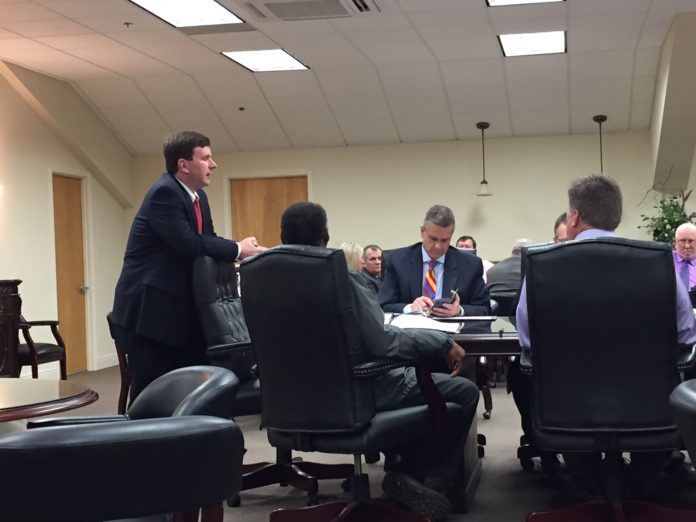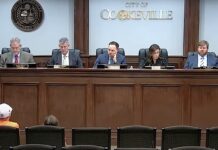Collins investigation report expected at Apr. 17 meeting
By Amye Anderson
UCBJ Managing Editor
COOKEVILLE – As members of UCHRA’s executive committee continue to wade through the various inconsistencies regarding its controlling measures of operation, a series of amendments to those bylaws, approved Thursday, are now headed to the governing board for approval before becoming official.
In a continuation of the Feb. 20 meeting, board members and agency staff have been working to resolve outstanding issues and concerns left in the wake of an ongoing investigation regarding allegations of misconduct lodged against executive director Luke Collins. Collins was placed on leave during that meeting and, since that time, the board has closed each meeting with a motion to recess, rather than adjourn.
Following the most recent meeting held Mar. 8, Danny Rader, agency legal counsel, has been researching the UCHRA bylaws to determine their compliance with state statutes. Rader presented board members with a draft of potential fixes within statute guidelines to correct a myriad of inconsistencies.
One such inconsistency reportedly involves the agency’s governing board. That board meets annually and, by statute, is required to have one representative from a local agency in each county who is “knowledgeable in dealing with problems concerning human resource agencies.”
That person has to be appointed by their respective county executive or county mayor. According to Rader, that representative could be both a consumer representative and a member of a local agency, such as a senior center or sheriff’s department.
“There are lots of agencies obviously in each of your counties that somebody may qualify,” Rader said. “It doesn’t have to be the director of those agencies; just somebody with the agency in some capacity.”
Rader also proposed a section regarding the powers, in order to clarify that the agency’s governing board is the board of directors.
Sometime after 1990, the board was incorporated as a nonprofit corporation. That, in addition to the agency’s existing “HRA” classification resulted in two sets of statutes for the agency to follow. The nonprofit act requires a board of directors, which has the general authority over the agency; including the agency’s various committees and boards.
“That is the governing board,” Rader explained. “I think in the absence of any provision of bylaws, the statute makes clear that the governing board is the one who has that authority. But, it’s best to have that clear in your bylaws.”
In another instance, the bylaws adopted by the agency in 2013 were “internally inconsistent,” Rader says. According to Rader, in one section of the bylaws, committees are to be established by the board and a chairman establishes the committees and appoints the members who will serve on it. Elsewhere, the bylaws state the executive committee will determine who serves on the various committees.
“You can’t have it both ways. You’ve got to pick a path and choose,” Rader said.
To further convolute the matter, neither of those conflicting bylaws-prescribed rules were being followed as the governing board would vote, at the annual meeting, to determine who served on each committee.
“The bylaws said two different things and what you’re actually doing was a third, completely separate thing,” Rader said.
When discussing consumer representatives, Rader recommended that those up for appointment for a vacant spot, by their respective county executive or county mayor, be or have been a consumer of UCHRA services within the year prior to their appointment to the consumer rep role.
“The statute does require consumer reps actually be consumers of (UC)HRA’s services,” Rader said.
According to Rader, UCHRA is the only such agency that claims to elect consumer representatives; though, an election in the traditional sense has reportedly not been conducted.
UCHRA has had at least 14 county mayors, three rotating city mayors, 14 consumer reps, with an additional three rotating consumer reps serving on the agency’s policy council. The board’s decision to proceed with Rader’s suggestions eliminated the three rotating consumer rep positions. At least 10 of the consumer reps listed on the roster presented to board members Thursday do not meet the qualifications to serve in the capacity as a consumer rep.
“You guys have so many counties that you’ve got so many people on the policy council that you’ve, I think, got more than anybody in total members,” Rader said.
The discussion of consumer reps came to light in a previous installment of this ongoing meeting. At the meeting held Feb. 20, some board members indicated they’d never been involved in the selection of a consumer rep and had never even seen a list of potential candidates.
Jack Stites, a consumer representative serving on the agency’s policy council and its various committees, addressed the board regarding his role as a consumer rep.
“Mr. Rader’s done an excellent job of pointing out that there is no part of the qualification for consumer reps that I meet,” he told the committee. “With that being said, it’s been wonderful, it’s been a great experience, I appreciate getting to know a lot of you guys, and I officially resign.
“I’m not even sure I’m official anyway after having heard that (report),” Stites added with a laugh.
Though there are no official provisions within the statute regarding a minimal threshold of qualifications to serve as a consumer rep, Rader suggested a few basic provisions in light of the recent discrepancies revealed regarding the selection of those representatives.
Future appointees would be reviewed to confirm they are or have been a consumer of services and will have to have utilized a UCHRA-offered service at least once within one year prior to their appointment. The same county executive who appoints the consumer rep will have the authority to remove their respective appointee from that role.
In other action, Rader informed board members that the investigation regarding allegations of misconduct made against Luke Collins, the agency’s executive director who was placed on paid administrative leave by the board in February, is nearing completion.
The executive committee voted in favor of conducting the attorney-client meeting, a closed-door session, prior to the next regular board meeting, which is open to the public, next month. The UCHRA and UCDD boards will meet in a joint session, per the suggestion of Mark Farley, UCDD executive director and interim UCHRA director.
The board will meet again on Apr. 17, following the attorney-client meeting.








